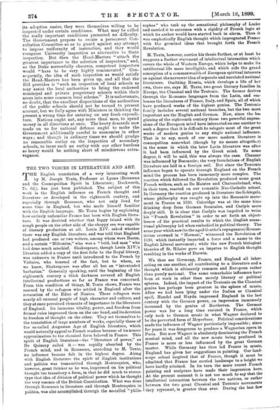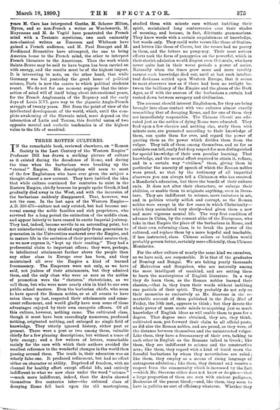THE TWO VOICES IN LITERATURE AND ART.
THE English translation of a very interesting work by M. Joseph Texte, Professor at Lyons (Rousseau and the Cosmopolitan Spirit in Literature; Duckworth, 7s. 6d.), has just been published. The subject of this work is the English influence on French thought and literature as developed in the eighteenth century, and especially through Rousseau, who not only lived for some time in England, but who made himself familiar with the English language. Mr. Texte begins by explaining how entirely unfamiliar France has been with English litera- ture. It was doubted whether that foggy island with its rough people on the other side of the choppy sea was capable of literary production at all. Louis XIV. asked whether there was any English literature, and was told that England had produced one or two writers, among whom were Bacon, and a certain "Miltonins," who was a "bold, bad man" who had done much mischief. Shakespeare, though Louis XIV.'s librarian added a copy of the first folio to the Royal library, was unknown in France until introduced to the French by Voltaire, who boasted of the fact, but to whom, as we know, Shakespeare was after all but an "intoxicated barbarian." Generally speaking, until the beginning of the eighteenth century a thick darkness covered all English intellectual productions so far as France was concerned. From this condition of things, M. Texte shows, France was rescued by the refugees who settled in England after the revocation of the Edict of Nantes. These refugees were nearly all unusual people of high character and culture, and they at once perceived elements of importance in the literature of England. Its immense vitality, power, and freedom from formal rules impressed them on the one hand, and its devotion to freedom of thought on the other. They set themselves to the translation of large numbers of works, especially those of the so-called Augustan Age of English literature, which would naturally appeal to French readers because of its nearer approximation to the classical form beloved in France. This spirit of English literature—the "literature of power," as De Quincey called it — was rapidly absorbed by the French mind, and in Rousseau, according to M. Texte, its influence became felt in the highest degree. Along with English literature the spirit of English institutions and politics was transmitted through Montesquieu, however, great thinker as he was, impressed on his political thought too transitory a form, in that he did much to stereo- type that idea of division of political power which he thought the very essence of the British Constitution. What was done through Rousseau in literature and through Montesquieu in politics, was also accomplished through the so•called " philo•
sophes " who took up the sensational philosophy of Locke and carried it to extremes with a rigidity of French logic at which its author would have started back in alarm.. Thus it was emphatically English thought which impregnated France with the germinal ideas that brought forth the French Revolution.
M. Texte, however, carries his thesis further, or at least he suggests a further statement of intellectual interaction which covers the whole of Western Europe, which helps to make its intellectual life more intelligible, and which aids the grand conception of a commonwealth of European spiritual interests as against the narrower idea of separate and unrelated national literatures. Omitting Russia, which develops a life of her own, there are, says M. Texte, two great literary families in Europe, the Classical and the Teutonic. The former derives through the Romance languages from the Latin, and em- braces the literatures of France, Italy, and Spain, all of which have produced works of the highest genius. The Teutonic family includes several national branches, but the two most important are the English and German. Now, since the bee ginning of the eighteenth century these two powerful expres- sions of the European mind have interacted on one another to such a degree that it is difficult to relegate most of the great works of modern genius to any single national influence. That is to say, much of our more modern literature is cosmopolitan somewhat (though by no means altogethcr) in the sense in which the later Latin literature was after it had been influenced by the Greek mind. To some degree, it will be said, this was always the case. Chaucer was influenced by Boccaccio; the very foundations of English literature are laid in a foreign soil. But since the Teutonic influence began to operate through England on the French mind the process has been immensely more complex. The reaction which followed the Revolution produced some great French writers, such as De Maistre and Chateaubriand, who, in their turn, reacted on our romantic Neo-Catholic school. In Germany the reaction produced in literature the Schlegels, whose philosophy was caught up into the Romantic move- ment in France in 1830. Coleridge was at the same time drinking deep from German fountains, and Carlyle more deeply still. It is clear that Carlyle was impelled to write his "French Revolution" in order to set forth an object- lesson of the practical results to which the English sensa- tional philosophy led when embodied in political theory. The same year which saw (to the aged Goethe's repugnance) Roman- ticism crowned in " Hernani," witnessed the Revolution of 1830, which instantly imparted a force and a name to the English Liberal movement; while the new French biological theories of St. Hilaire gave an impetus to English thought resulting in the works of Darwin.
We thus see Germany, France, and England all inter- acting on one another, all contributing to a literature and a thought which is ultimately common and European rather than purely national. The same remarkable influences have been at work in other than merely literary or political spheres. Indeed, the impact of the Teutonic on the Classical genius has perhaps been greatest in the sphere of music. After we had been lying under the Italian or Classical spell, Handel and Haydn impressed England in the last century with the German power, an impression immensely increased by the genius of Beethoven. The German power was for a long time resisted in France, which only took to German music in what Wagner declared to be the perverted form of Meyerbeer. Political considerations made the influence of Wagner particularly impossible; since for years it was dangerous to produce a Wagnerian opera in Paris. But now Wagner is absolutely dominating the French musical mind, and all the new music being produced in France is more or less influenced by the great German master. While Germany has thus led France in music, England has given her suggestions in painting. Our land- scape school inspired that of France, though it mast be admitted that France has carried landscape to a height we have hardly attained. In its turn the more recent French painting and sculpture have made their impression here. At the present moment it is not too much to say that the intellectual interaction between the two nations, or rather between the two great Classical and Teutonic movements they represent, is greater than ever. During the last few years IL Caro has interpreted Goethe, ?IL Scherer Milton, Byron, and so non-French a writer as Wordsworth, M. Huysmans and M. de Vogii6 have penetrated the French mind with a Teutonic mysticism, two such eminently non-classical writers as Emerson and Whitman have gained a French audience, and M. Paul Bourget and M. Ferdinand Brunetiere have attempted, the one to bring America home to the French mind, the other to interpret French literature to the Americans. Thus the work which Sainte-Benve may be said to have begun has been carried on with energy, and the results must be of the highest import. It is interesting to note, on the other hand, that while Germany was but yesterday the great home of political science, Paris is now the centre to which political students resort. We do not for one moment suppose that the inter- action of mind will of itself bring about international peace, for the French Anglomania of the Regency and the early days of Louis XVI. gave way to the gigantic Anglo-French struggle of twenty years. But from the point of view of the intellectual development of the world, which, until the com- plete awakening of the Slavonic mind, must depend on the interaction of Latin and Teuton, this fruitful union of two opposite mental and msthetic tendencies is of the highest value to the life of mankind.







































 Previous page
Previous page